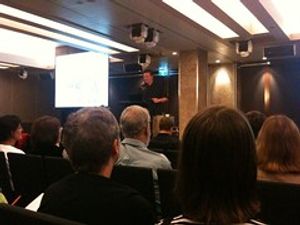what game are you in?
published onMost of last week was spent at the DEHub/ODLAA Education 2011-2021 Summit: Global challenges and perspectives of blended and distance learning here in Sydney. I'll try to share some of the highlights here followed by a couple of session specific posts.
To begin I was intrigued by the choice of terminology in the title and the purposeful exclusion of 'e-learning' and while we did on the whole get it over and done with on day 1, there WAS a lot of wasting of time and posturing around definitions. We should be flexibly meeting the needs and interests of ALL learners via a blend of methodologies and strategies whether they be distanced from the actual physical institution (physically, socially etc) OR within its walls. It is absurd to think that models of 'distance education' that abounded in the 1980s when I first studied independently, and which I was horrified to hear described as "the glory days of distance education", which comprised solely of large bundles of text based readings and study guides, are indeed models that should be still in place today. (At the time of was finishing my education degree while teaching casually on Melville Island - I had no contact with my peers or lecturer apart from comments on returned assignments). Efforts to maintain a viable position for outdated models of provision came across as little more than geriatric academics attempting to remain relevant. Of course we have taken from those old models what worked; of course they were better than nothing in their day.
During the Day 1 morning panel it was revealed that some employers and in fact some countries are refusing to recognise qualifications completed via virtual labs and online study. Some are calling for the modality of courses to be listed in the academic transcript. Interesting given the apparent growth in Open Universities including the OU of Nepal discussed by Mohamed Ally on Day 3. Mark Brown from Massey Uni raised the current NZ policy stance that 'real education happens on campus' and the implications of this for a country where 80% of DE learners are over 25, two thirds are women and it is the preferred mode for 35% of Maori learners. Unfortunately he says 'Government is not interested in personal narrative' when it comes to policy decision making. Mark also discussed trends in the US for corporate ownership of universities (Kaplan owned by the Washington Post and the Walmart/Uni partnership as egs) as the commoditisaton of education.
Yoni Ryan raised issues around the reactive (as opposed to interactive) nature of current online design, comparing the common current model of making a few minor LMS content tweaks and a few comments in discussion boards, to both private US institutions like the Uni of Phoenix where new online course development is supported with 10-20 hrs/week over 5 months and also to previous DE team development models.
Throughout the conference there was a call to separate research intensive and teaching intensive roles in Higher Ed.
Terry Anderson prefaced his Day 1 keynote with the values of:
- student control and freedom
- continued education opportunities as a basic human right, and that
- we can continually improve the quality, effectiveness, appeal, cost and time efficiency of the learning experience
He spoke of 3 generations of distance education pedagogies - I'll return to this in a later post.
On Day 2 I enjoyed a workshop by Debra Hoven from Athabasca on e-portfolios, a panel on 'Openness', and a presentation by Gilly Salmon on 'Creating viable futures for learning' which I'll return to in separate posts. Social inclusion finally raised its head!
I've been thinking a lot lately about how teachers can be supported, what scaffolds can be created, to engage in quality learning design so I found Diana Laurillard's keynote - 'The critical role of teachers in optimising technologies for open learning' - very interesting. Diana spoke about a (quite sophisticated) starter kit to allow teachers to share learning designs adaptable across different content areas - a creative design starter kit.
In Day 3s afternoon keynote Mohamed Ally spoke on Mobile Learning and asked are we ready for 'education in the pocket'?. He related the story of a very rudimentary Sth African school lacking in physical learning materials but where the teacher said "we have cell phones". He reported research indicating that while (in 2007) 94% of students were ready for mobile learning only 60% of staff were, and last weeks Australian newspaper research outcomes indicating that Uni dropout in Australia was largely due to poor teaching, course content, life issues and paid work commitments. He is working to support the development of the Open University of Nepal where students will be given mobile devices if required. Mohamed introduced a new digital divide definition: where learners have the technology but not the learning materials and opportunities.
I have to say the panel session 'Anticipating the future' following was characterised with a large degree of doom and gloom:
- lean and mean policy
- funding games and manipulation
- innovation ONLY if it fits within Government directions
- staffing issues
- a continuing emphasis on research at the detriment of teaching
- increased casualisation of teaching staff to fill research buy out gaps
- private provider competition (focusing on teaching not research)
Phil Ice provided the Day 4 morning keynote and spoke initially on two technologies that should change our practice: Android 2.2 allowing us to work within different form factors, and Adobe Integrated Runtime (AIR) that will allow interactive experiences and engagement with limited/ variable connectivity. He also spoke of the role of analytics and a tool developed to track student engagement and risk.
And finally Grainne Conole spoke on 'Social exclusion or inclusion in a WEb2 world': digital literacy, community, sociality, digital signatures. See also www.notschool.net and Cloudworks

[CC FlickR image shared by robynejay]